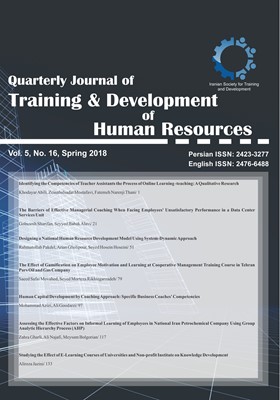Examining the Effect of Unlearning in the Organization on Human Resource Development
Subject Areas :Fahimeh Doosthosseini 1 , ***** ***** 2 , mehdie Safi 3
1 - University of Yazd
2 - Yazd University
3 - University of Yazd
Keywords: Learning, Unlearning, Human Resource Development, Knowledge.,
Abstract :
In today's world, organizations always face different environmental and technical changes; in order to adapt to these changes, they need to learn and apply new knowledge and technology, but they must consciously acquire knowledge that is obsolete and obsolete for any reason. Identify and take proper measures to cut or end the degree of dependence on it. The main purpose of the research is the effect of learning dehumanization on the development of employees of the organization of work and social welfare of Alborz province. Learning outcomes include awareness, stopping the development of obsolete knowledge, leaving, isolating, integrating, and encouraging the use of new knowledge. In this study, the impact of these components on the development and development of employees has been addressed. The present research is applied in terms of purpose and based on nature and method of descriptive - correlation. The statistical population of the research includes supervisors, managers and employees in the Labor and Social Security Organization of the Alborz Province in 1230 people. Morgan table was used to decide the sample size. Based on the amount of statistical population, the sample size is estimated to be 293 people based on the Morgan table. The instrument of gathering in this research is a researcher made questionnaire. To analyze the collected data, the emulsion structural equation modeling software (Amos) was used. The results of the research showed that learning depletion and its dimensions have a positive and significant effect on employee development.
1. Jiménez-Jiménez D, Sanz-Valle R. Innovation, organizational learning, and performance. Journal of business research. 2011;64(4):408-17.
2. Cepeda-Carrión I, Leal-Millán AG, Ortega-Gutierrez J, Leal-Rodriguez AL. Linking unlearning with service quality through learning processes in the Spanish banking industry. Journal of Business Research. 2015;68(7):1450-7.
3. Leal-Rodríguez AL, Eldridge S, Roldán JL, Leal-Millán AG, Ortega-Gutiérrez J. Organizational unlearning, innovation outcomes, and performance: The moderating effect of firm size. Journal of Business Research. 2015;68(4):803-9.
4. Hedberg B. How organizations learn and unlearn in Handbook of organizational design eds. PC Nystrom and WH Starbuck, 8-27. University Press, London; 1981.
5. Nystrom PC, Starbuck WH. To avoid organizational crises, unlearn. Organizational dynamics. 1984;12(4):53-65.
6. Yildiz HE, Fey CF. Compatibility and unlearning in knowledge transfer in mergers and acquisitions. Scandinavian Journal of Management. 2010;26(4):448-56.
7. Akgün AE, Byrne JC, Lynn GS, Keskin H. New product development in turbulent environments: Impact of improvisation and unlearning on new product performance. Journal of Engineering and technology Management. 2007;24(3):203-30.
8. Becker K. Unlearning as a driver of sustainable change and innovation: three Australian case studies. International Journal of Technology Management. 2008;42(1-2):89-106.
9. Sheng ML, Chien I. Rethinking organizational learning orientation on radical and incremental innovation in high-tech firms. Journal of Business Research. 2016;69(6):2302-8.
10. Özsahin M, Zehir C, Acar AZ. Linking leadership style to firm performance: the mediating effect of the learning orientation. Procedia-Social and Behavioral Sciences. 2011;24:1546-59.
11. Lin HE, McDonough EF, Lin SJ, Lin CYY. Managing the exploitation/exploration paradox: The role of a learning capability and innovation ambidexterity. Journal of Product Innovation Management. 2013;30(2):262-78.
12. Kandemir D, Hult GTM. A conceptualization of an organizational learning culture in international joint ventures. Industrial marketing management. 2005;34(5):430-9.
13. Hult GTM, Ketchen DJ, Nichols EL. Organizational learning as a strategic resource in supply management. Journal of Operations Management. 2003;21(5):541-56.
14. Zahra SA, Abdelgawad SG, Tsang EW. Emerging multinationals venturing into developed economies: Implications for learning, unlearning, and entrepreneurial capability. Journal of Management Inquiry. 2011;20(3):323-30.
15. García-Morales VJ, Jiménez-Barrionuevo MM, Gutiérrez-Gutiérrez L. Transformational leadership influence on organizational performance through organizational learning and innovation. Journal of business research. 2012;65(7):1040-50.
16. Elliott C, Goh S, editors. Organizational learning and performance outcomes: a review of the empirical literature and measurement of the construct. ASAC Annual Conference; 2006.
17. Zhang D, Zhang Z, Yang B. Learning organization in mainland China: empirical research on its application to Chinese state‐owned enterprises. International Journal of Training and Development. 2004;8(4):258-73.
18. Lee I-C, Hsu Y-L, Lin M-JJ. Relationships among unlearning, knowledge application, and new product development performance: Exploring the moderating effect of the information processing mechanism. African Journal of Business Management. 2011;5(13):5297.
19. De Holan PM, Phillips N. Organizational forgetting. Handbook of Organizational Learning and Knowledge Management John Wiley, Chichester. 2011:433-52.
20. Windeknecht K, Delahaye B, editors. A model of individual and organisational unlearning. Proceedings 18th annual Conference of the Australian and New Zealand Academy of Management, Dunedin, NZ; 2004.
21. Fernandez V, Sune A. Organizational forgetting and its causes: an empirical research. Journal of organizational change management. 2009;22(6):620-34.
22. Savitha R, Suresh S, Kim H. A meta-cognitive learning algorithm for an extreme learning machine classifier. Cognitive Computation. 2014;6(2):253-63.
23. Tsang EW. Transferring knowledge to acquisition joint ventures: an organizational unlearning perspective. Management Learning. 2008;39(1):5-20.
24. Pighin M, Marzona A. Unlearning/relearning in processes of business information systems innovation. Journal of Information and Organizational Sciences. 2011;35(1):59-72.
25. Narehan H, Hairunnisa M, Norfadzillah RA, Freziamella L. The effect of quality of work life (QWL) programs on quality of life (QOL) among employees at multinational companies in Malaysia. Procedia-Social and Behavioral Sciences. 2014;112:24-34.
26. Chua RY-J, Iyengar SS. Empowerment through choice? A critical analysis of the effects of choice in organizations. Research in organizational behavior. 2006;27:41-79.
27. Ross ME, Blackburn M, Forbes S. Reliability generalization of the patterns of adaptive learning survey goal orientation scales. Educational and Psychological Measurement. 2005;65(3):451-64.
28. Noor SM, Abdullah MA. Quality work life among factory workers in Malaysia. Procedia-Social and Behavioral Sciences. 2012;35:739-45.
29. Adli F. Learning bleaching strategy to learn more. Education Strategies in Medical Sciences. 2010;3(1):7-8.


